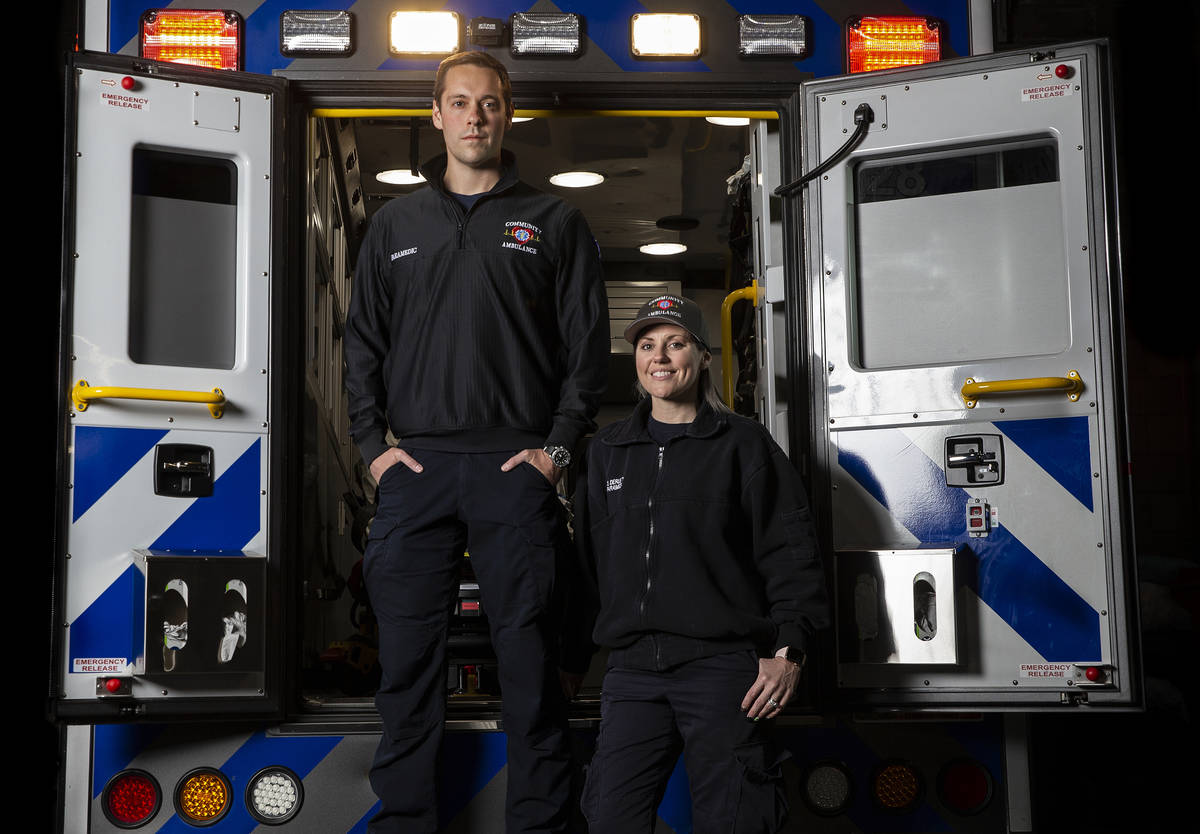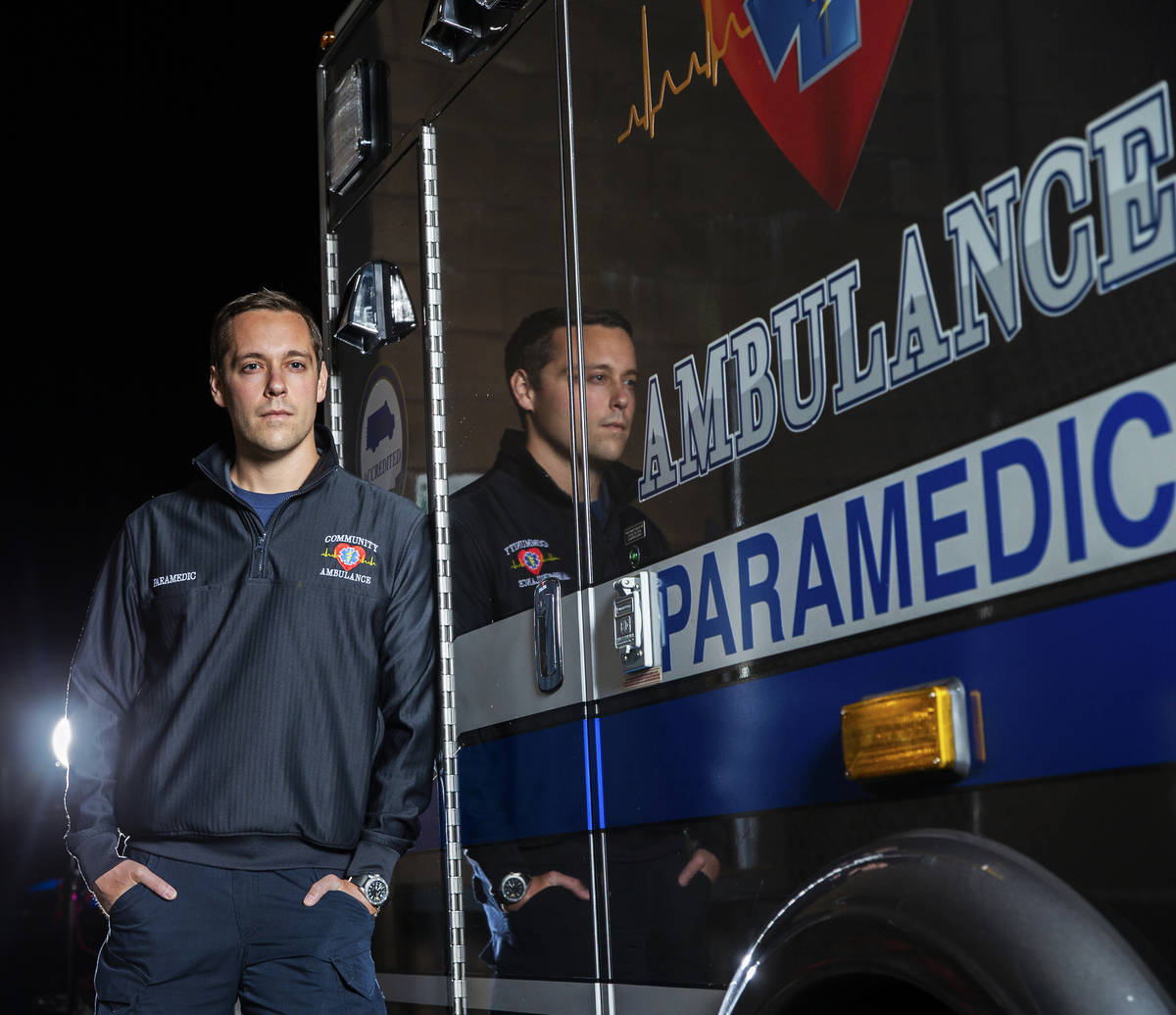Advice from paramedics on front line of coronavirus fight: ‘Stay home’
From inside his Community Ambulance rig, paramedic Jeff Yost has noticed a slow, determined shift throughout the Las Vegas Valley.
He always wore protective equipment. Now, he and his crew wear more, more often, even though it’s in short supply.
The roads are emptier. Less traffic, fewer car crashes, and about 35 percent fewer medical calls since the beginning of the year. But about a third of the calls Yost and other crews are still responding to are now COVID-19-related, according to Glen Simpson, the private ambulance company’s director of special operations.
When Yost transports patients to area hospitals, there are new procedures. Some facilities have entirely separate drop-off areas for patients suspected of having the coronavirus, he said.
And when his shift ends, it takes about 30 minutes to make sure — as best he can — he’s not tracking the virus into his home, where his family waits for him.
He changes out of his uniform at the station. He throws his work boots in the back of his truck. He dumps his new change of clothes into a hamper when he gets home. His first stop is the shower.
“If something happens to me — I knew that when I was getting into this,” Yost said. “If I get my family sick, that’s what I worry about.”
As a paramedic, Yost is familiar with crisis. On Oct. 1, 2017, he ended up in the middle of one — the Route 91 Harvest festival shooting on the Strip, which left 58 dead and hundreds injured.
He was off duty that night, enjoying the music. But when the attack started, he jumped in to help, ultimately triaging victims in the on-site medical tent.
“That event was just — flip the switch and it’s happening,” he said. “There’s no ramp-up. You know it’s going to be over at some point, one way or the other. Whereas this — there is no end point, because you don’t know what exactly the timeline is.”
Lack of resources
More than 260 paramedics in the valley work with Community Ambulance. Since the pandemic began, 13 have potentially been exposed, and two are currently self-quarantining, according to Simpson, the operations director. None have exhibited symptoms.
Local firefighters also respond to area medical calls, along with private MedicWest Ambulance and American Medical Response Las Vegas, which declined interviews.
The Clark County Fire Department about a week ago reported four firefighters had tested positive for the virus. At the time, two were nearing the end of their quarantine, and Chief John Steinbeck said he was enlisting the help of retired firefighters in case more get sick.
Simpson, with Community Ambulance, said his crews are rationing personal protective equipment. Each day, crew members get a new N95 mask, but following guidelines from the Centers for Disease Control and Prevention, they do not use the same mask for more than five calls each day.
Clark County Deputy Fire Chief Warren Whitney said his crews are rationing equipment too.
“We’re trying to use an overabundance of caution,” Whitney said, “but we are very aware of the limited supply, so we are still trying to be conservative.”
Local businesses have also stepped in to help: Meta Pharmacy Services, High Voltage Detox and Thrive Solutions are each providing hand sanitizer to paramedics.
TeBella Promotions is crafting new face shields. Polar Shades is making face masks and gowns.
Some local hotel operators are offering complimentary rooms at their otherwise closed properties to first responders, so they can better self-isolate from their families.
“Everybody is extremely thankful,” Whitney said.
While on calls, Simpson said his crews do their best to space themselves out. But an ambulance is an enclosed, confined space, and the protective equipment — which is still running low — is their only barrier.
“A lot of my work has been making sure we have the resources we need,” Simpson said.
Mental toll
Aside from the physical risk of exposure, Simpson, who helped steer his crew through the aftermath of the Las Vegas shooting, said he is acutely aware of their mental well-being right now.
Like Yost, many worry about exposing their families. Some are living in separate rooms or areas of their houses or apartments.
“We live and breathe in these moments where we’re needed and we’re able to help people, and we’re still doing that,” Simpson said. “But I don’t know if we truly know the mental toll that this is taking on our responders — just the fact that they don’t physically get to touch their child for the next month, maybe longer than that, or the mental toll of not knowing whether they have it or not.”
Each time they show up for work, Simpson said, they go through a screening. It involves taking their temperature, but it also involves questions about how they are doing, and if they are subject to self-quarantining: Do you have enough food? Do you have enough resources to take care of yourself?
To better inform crews responding to calls, 911 operators throughout the valley also have instituted a set of coronavirus screening questions, asking incoming callers about any possible symptoms or if they’ve been around someone they know is sick. It’s a loose way to try to determine the risk of exposure from each new patient.
But crews still operate under the assumption that everyone may be carrying the virus.
‘Stay home’
Sarah Derleth, a paramedic and field training officer with Community Ambulance, said mentally, she has been handling the situation as well as she can.
Her husband also works in the medical field, so having someone to talk to at the end of the day who understands her experience has been comforting.
“I have to report to work; I have a job that I have to do,” she said. “So when I come home, and I am around my children and my husband, I have a little more anxiety. But I am being mindful.”
She hopes the public is being mindful too, especially with no clear finish line in sight.
“People really need to take this seriously,” she said. “It’s going to take longer than two weeks. So they need to be patient, and they really need to adhere to the advice that’s been given to us. Stay home.”
Contact Rachel Crosby at rcrosby@reviewjournal.com or 702-477-3801. Follow @rachelacrosby on Twitter.



















